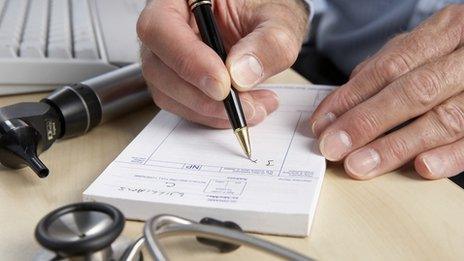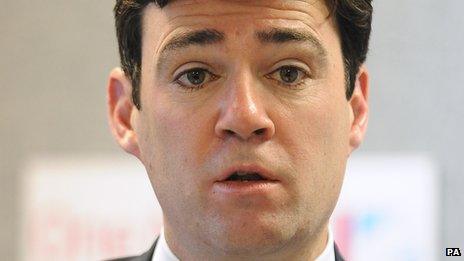Family doctor services 'under threat of extinction'
- Published
- comments

GPs have been the bedrock of the NHS, says the royal college
A funding crisis and increased demand for care means general practice as patients know it in the UK is "under severe threat of extinction", the head of the Royal College of GPs has warned.
The royal college's president, Dr Maureen Baker, said failing to properly fund GP surgeries could have an impact on the sustainability of the NHS.
Some practices were already closing due to lack of staff, she said.
The Department of Health said it recognised the "vital" job GPs do.
Health think tank the King's Fund agreed that GP services were under increasing pressure, but said talk of "extinction" was "a huge exaggeration".
'Toxic mix'
While general practice deals with 90% of patient contact, it only receives 8.39% of the overall NHS budget, the RCGP said.
Dr Baker urged governments in London, Cardiff, Edinburgh and Belfast to take action to address the "huge and historic imbalance in funding".
"General practice as we know it is now under severe threat of extinction," said Dr Baker. "It is imploding faster than people realise and patients are already bearing the brunt of the problem."
She said: "For generations, GPs have been the bedrock of the NHS and provided excellent care for patients.
"But we can no longer guarantee a future for general practice as our patients know it, rely on it - and love it.
"GPs are doing all they can but we are being seriously crippled by a toxic mix of increasing workloads and ever-dwindling budgets, which is leaving patients waiting too long for an appointment and not receiving the time or attention they need and that GPs want to give them."
'Grave concerns'
Funding for GPs is vital to protect the future of the NHS as a whole, Dr Baker said.
"Cutting funding to the bone is a false economy - by investing in general practice, we are shoring up the rest of the NHS from collapse," she added.
"We are fiddling while Rome burns and the four governments of the UK must wake up to the critical state that general practice is now in."
If there is not sufficient funding in the 2014/15 budget rounds, the RCGP has "grave concerns for the sustainability of the NHS", according to its president.
The royal college says that funding for general practice in England has fallen by £400m in real terms over the past three years.
In October, it published a report saying that £8.5bn had been invested in 2012-13, compared with £8.3bn in 2009-10, which is the equivalent of £8.9bn in 2012-13 prices.
And in November, it published figures, external with the National Association for Patient Participation showing GP funding across the UK at a nine-year low.
Between 2004-05 and 2011-12, the proportion of the NHS budget spent on general practice had fallen from 9.47% to 7.78% in Scotland and from 8.58% to 7.77% in Wales, it said.
In Northern Ireland, the figure dropped from 8.22% in 2010-11 to 8.1% in 2011-12.
Dr Baker told BBC Radio 5 live that while budgets had dwindled over the past three years, demand for GP services was increasing - from 300 million consultations in 2008 to 340 million in 2012.
She warned that "in some areas, we believe that some practices are already shutting down".
She welcomed government moves to train more medical staff, but called for immediate action "to shore up the service in the next few years, until these new doctors, nurses and support staff come on stream".
Increase in trainees
Prof Chris Ham, chief executive of health think tank the King's Fund, said that factors such as the ageing population and the complex needs of patients were putting GP surgeries under pressure, and he agreed their share of the NHS budget had fallen in recent years.
But he added: "I'm not denying the real pressures and the lack of funding, but it's a massive leap from saying that to saying GPs face extinction."
He said some surgeries were finding ways to cope with the pressures, including by offering more services by telephone and email.

Labour's Andy Burnham said appointment delays were "simply unacceptable"
An RCGP survey found that 62% of 1,007 people questioned thought the number of consultations carried out by GPs each day, believed to be between 40 and 60 in most cases, risks the standard of patient care they provide.
More than a quarter, 28%, said the last time they tried to book an appointment with their doctor they could not get one in the same week.
Four in 10 were worried that the amount of time they have to wait to see their GP could affect their health.
The poll, carried out by ComRes, also showed that 60% of the public want funding moved to general practice from other parts of the health service.
Shadow health secretary Andy Burnham said it was "simply unacceptable" that some patients had to wait up to a week for a GP appointment.
He said this was putting pressure on hospital accident and emergency departments.
A DoH spokesperson said: "We recognise the vital job that GPs do.
"This is why we have cut GPs' targets by more than a third to free up more time with patients, and are dramatically increasing trainees so that GP numbers continue to grow faster than the population."
NHS England said its funding for GP services had increased by a third in real terms since 2002-03. It said recent changes to the GP contract would free up doctors' time by removing "rigid performance targets".
- Published24 December 2013
- Published3 October 2013
- Published1 October 2013